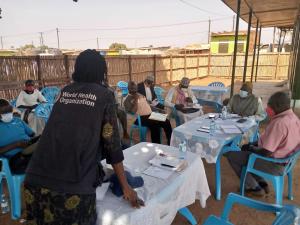HIV/AIDS Network Offers opportunity to Advance COVID-19 Community Work in Kanungu, Southwestern Uganda
Uganda has battled HIV/AIDS for over three decades and in that time, hundreds of people have died, thousands have survived, and a lot of capacity has been developed. It is, however, the capacity aspect especially at the community level, that has given mileage to Uganda’s COVID-19 response.
For instance, Kanungu district, in southwestern Uganda has a Network of People Living with HIV/AIDS (PLHAs) with a membership of over 7,000 with the purpose of strengthening adherence to treatment and sensitizing communities on HIV/AIDS prevention.
When COVID-19 struck, PLHAs were identified as one of the vulnerable groups that must be prioritized in terms of information, prevention, and treatment services. Kanungu district authorities did exactly this, but they also decided to take advantage of the network to extend COVID-19 response in the communities.
While requesting the World Health Organization (WHO) for technical and financial support towards this cause, the Kanungu District Health Educator Maari Karungi implored that: “There is an association of people living with HIV/AIDS who can be mobilized for COVID-19, but they can also help us reach many people through their network.”
The WHO field team took note and subsequently, with funding from the Governments of Ireland and Denmark, provided the much-needed training on preventing COVID-19, to 25 coordinators of the network who operate at the sub-county level. They were trained on the basics: proper handwashing with soap and water, physical distancing, and the correct and consistent wearing of masks. Rumours, misinformation, and misconceptions on COVID-19 were also covered.
They were also supported to develop a set of simple, clear messages that address the top-priority behaviour-change issues including recognizing symptoms, guidance on self-isolation, infection prevention and control as guided by the technical team.
For wider reach and good geographic coverage, the network leaders pledged to work with other community networks with deep local links such as religious communities, local community networks, community-based organizations, community health workers, extension workers among others, to establish teams of community mobilisers to popularize priority messages and establish systems for community self-enforcement.
Personal protection was emphasized in the training session with the WHO team providing clear safety guidance on how to work in communities while observing the Ministry of Health COVID-19 Standard Operating Procedures. Additionally, the group was taken through communication skills and approaches including community engagement, responding to sensitive questions and concerns with empathy to increase trust and minimize refusal. The PLHIV leaders were asked to always reach out to district health teams, whenever in need of support.
After the training, the Chairperson of the network Geoffrey Katabazi, appreciated WHO’s invaluable support towards equipping his members and the population with the knowledge on COVID-19.
“On behalf of my colleagues, I wish to appreciate the WHO team for being available to educate and sensitize coordinators of people living with HIV/AIDS. There is no doubt that the information given is useful in ensuring that we mitigate the spread of COVID-19. I urge my colleagues to take the information when holding sub-county meetings, which will be an opportunity to pass on the knowledge to a wider community,’’ Katabazi said.
Maari Karungi the DHE echoed the same sentiments adding that, “on behalf of the district leadership, I want to thank the WHO team for singling out people living with HIV/AIDS. These people have followers in every sub-county, so training them means you have reached many people who would otherwise have been missed.”
Akin to Oliver Twist, Dr Stephen Sebudde, the District Health Officer asked for more. “We extend an open invitation to WHO to help us strengthen other areas of the response such as Infection Prevention and Control and social mobilization particularly targeting schools and other vulnerable populations,’’ he said.
An effective response to COVID-19 calls for intensified community actions that reach the most vulnerable and the most at-risk populations. These include people living with HIV/AIDS and the Kanungu Network of People Living with HIV/AIDS (PLHAs) aptly provided that opportunity.
Health Promotion Advisor
Tel. : +256 414 335505
Cell: +256 772 507906
Email: sensasib [at] who.int
Public Information Officer
Tel. : +256 313 335569
Cell: +256 786 497073
Email: mwebembezie [at] who.int



